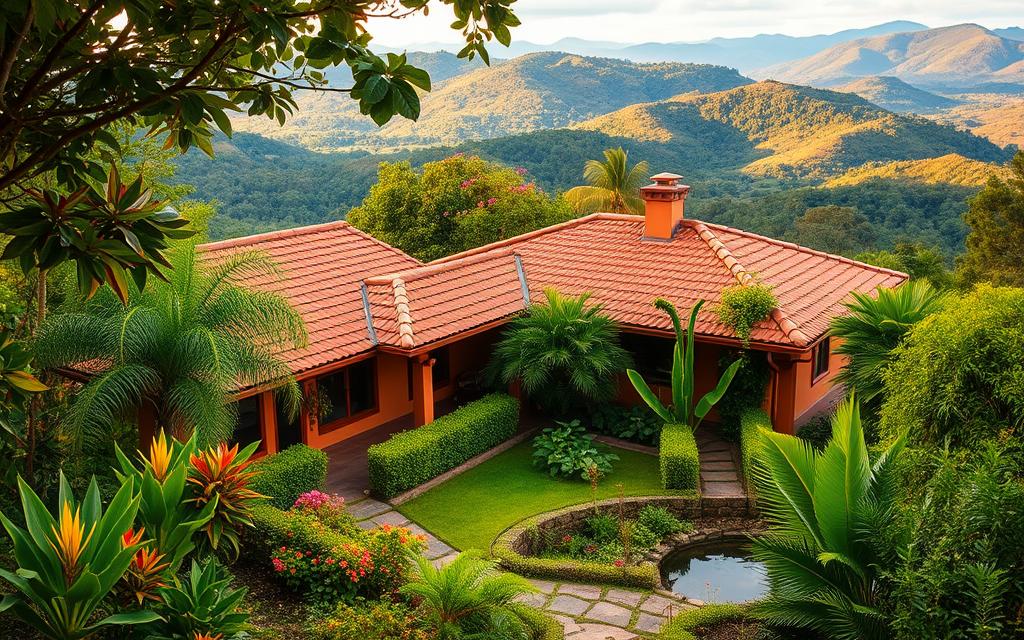Own a $150,000+ Home Privately? You may be eligible for Costa Rica Residency


Costa Rica has emerged as a haven for individuals and families seeking a better quality of life, with its lush landscapes, pleasant climate, and rich cultural heritage. The country's residency programs are designed to attract foreign investment, offering a straightforward path to legal residency.
Through investment in property, individuals can obtain residency, making it an attractive option for those looking to relocate. Owning a private property valued at $150,000 or more is a key pathway to securing residency in this tropical paradise.
Understanding the nuances of Costa Rica's residency options is crucial. The country's programs favor private home ownership over corporate property ownership, making it essential to comprehend the distinction.
The Appeal of Costa Rica Residency for Private Homeowners

Costa Rica's unique blend of natural beauty and modern amenities makes it an ideal choice for individuals considering residency. The country's appeal is multifaceted, ranging from its stable democratic government to its high-quality healthcare services and exceptional quality of life.
Why Costa Rica Has Become a Top Destination for Expatriates
Costa Rica has established itself as a premier destination for expatriates due to its strategic location, offering proximity to North America while providing a tropical climate and lower cost of living. This makes it particularly attractive for retirees and remote workers seeking residency options. The country's real estate market is diverse, offering various options for potential residents, from beachfront properties to mountain estates.
We've observed that the connection between private home ownership and residency status in Costa Rica creates a straightforward path to legal residency. This path doesn't require complex business investments or excessive paperwork, making it an appealing option for many.
The Connection Between Private Home Ownership and Residency Status
The investment in private property not only secures your residency status but also provides you with a tangible asset in a country known for its stable real estate market and appreciation potential. For those interested in navigating the legal aspects of residency, it's beneficial to consult with experienced legal firms that specialize in Costa Rica residency applications.
Costa Rica offers a variety of residency options, including rentista residency for those with stable income, investment residency for those contributing to the country's development through business investment, and permanent residency for foreigners who meet specific legal requirements. By obtaining residency, individuals are entitled to numerous benefits, including temporary or permanent residency permits, new business opportunities, and the freedom to travel without visa restrictions.
Understanding Costa Rica's Residency Programs

The Costa Rican government has established multiple residency categories to cater to different needs and circumstances. Costa Rica offers a variety of residency options to suit the needs and circumstances of applicants. Among the most common options are rentista residency, designed for those who have stable and sufficient income; investment residency, for those who wish to contribute to the development of the country through business investment; and permanent residency, which allows foreigners to live indefinitely in the country after meeting specific requirements established by law.
Overview of Available Residency Categories
Costa Rica offers several distinct residency programs, each designed to accommodate different applicant profiles. These include the Rentista Program for those with stable income, the Pensionado Program for retirees with pension income, and the Inversionista Program for investors. The Inversionista Program, for instance, requires a $200,000 investment in Business, Real Estate, Stocks, or Securities, and is valid for 2 years, renewable. For more detailed information on how to navigate these programs, you can visit our guide on obtaining Costa Rica residency through real estate.
These programs are designed to be accessible while ensuring that applicants have genuine ties to the country. Property ownership is considered a tangible demonstration of commitment to the nation.
How Private Home Ownership Fits Into the Residency Framework
The private home ownership residency option fits seamlessly into Costa Rica's broader framework of encouraging foreign investment while ensuring that residents have sufficient economic means to support themselves. We'll explain how the investment-based residency program specifically accommodates private homeowners who meet the $150,000 threshold, creating a straightforward path to legal status in the country. Understanding the distinctions between temporary residency and permanent residency is crucial, as most property owners initially qualify for temporary status, which can be converted to permanent residency after maintaining their investment for a specified period.
The residency application process through property investment typically involves fewer requirements than other visa categories, making it an attractive option for those seeking a streamlined path to legal status.
Own a Home Privately, Not Through a Company Can Make You Eligible for Residency
For foreign investors, owning a home privately in Costa Rica can be a strategic move towards securing residency. This approach not only simplifies the residency application process but also ensures compliance with the country's investment requirements.
The $150,000 Threshold: What It Means and Why It Matters
The $150,000 threshold for Costa Rica residency represents a strategic investment amount that balances accessibility for foreign investors while ensuring a meaningful economic contribution to the country's real estate market. This minimum investment amount is crucial for qualifying under the investor category of residency.
When evaluating property investments to meet this threshold, it's essential to understand that the valuation must be officially recognized through proper appraisals and documentation. This documentation will be scrutinized during the residency application process to verify the property's value.
Private vs. Corporate Ownership: Key Differences for Residency Purposes
Private home ownership, where the property is titled directly in your name rather than through a corporate entity, creates a more straightforward path to residency approval. It simplifies the ongoing requirements for maintaining your residency status.
Corporate ownership structures, while potentially beneficial for certain tax purposes, can complicate the residency application process. They may not qualify under the same investment residency provisions as private ownership. The distinction between private and corporate ownership affects not only your initial residency application but also impacts your pathway to permanent residency and potential tax obligations within Costa Rica.
Key considerations for private home ownership include:
- The $150,000 threshold represents a strategic investment that contributes to Costa Rica's real estate market.
- Private ownership simplifies the residency application and maintenance process.
- Corporate ownership can complicate residency applications and may not qualify under the same provisions.
- The distinction between private and corporate ownership affects initial residency, permanent residency, and tax obligations.
- The investment can be met through a single property or multiple properties, provided they are privately owned and meet the $150,000 requirement.
Step-by-Step Guide to Qualifying for Residency Through Home Ownership

We guide you through the essential steps to secure residency in Costa Rica by investing in a private home valued at $150,000 or more. This process involves several key components, including property requirements, financial documentation, and personal background checks.
Property Requirements and Documentation
The first step in qualifying for Costa Rica residency through home ownership is identifying and purchasing a suitable property. The property must be valued at $150,000 or more, and all documentation must clearly show private ownership in your name. We recommend working with a reputable real estate attorney who specializes in foreign property transactions to ensure your investment meets all legal requirements for residency qualification. For more information on the legal requirements, you can visit our page on legal requirements for residency in Costa.
Ensuring that your property investment is properly documented is crucial. This includes obtaining a clear property title and registering the property in your name.
Financial and Personal Requirements Beyond Property Ownership
Beyond property ownership, applicants must provide comprehensive documentation, including a valid passport, birth certificate, police clearance from your country of origin, marriage certificate (if applicable), and proof of sufficient income to support yourself while living in Costa Rica. Financial requirements beyond the property investment typically include demonstrating ongoing income or savings that will sustain your lifestyle in Costa Rica.
Personal requirements include a clean criminal record, good health (or adequate health insurance coverage), and a genuine intention to reside at least part-time in Costa Rica. The application process involves submitting your complete documentation package to Costa Rica's immigration department (DGME), followed by biometric data collection and potentially an interview to verify your intentions for residency.
The Application Process for Homeowner Residency

Navigating the Costa Rica residency application process can be complex, but understanding the steps involved can simplify the journey. The process involves several key steps that applicants must follow carefully to ensure a successful outcome.
Required Documentation and Paperwork
Gathering all required documentation is the first step in the application process. This includes proof of property ownership, passport, birth certificate, police clearance, marriage certificate (if applicable), and financial statements.
- The application process begins with gathering all required documentation, which must be properly authenticated through apostille or consular certification in your home country before submission.
- We advise that all foreign documents be professionally translated into Spanish by a certified translator recognized by the Costa Rican government to avoid delays in processing your residency application.
Timeline and Processing Expectations
After submitting the application, the waiting period begins. The timeline for processing can range from several months to over a year, depending on current processing volumes and the completeness of your application.
- Processing times for residency applications typically range from 3-12 months, with property-based applications often processed more quickly than other categories due to the straightforward nature of verifying the investment.
- During the processing period, applicants are generally permitted to remain in Costa Rica on tourist visas, which may require periodic border runs to renew until residency is approved.
- Once your application is approved, you'll receive a temporary residency card valid for 1-2 years, which can be renewed and eventually converted to permanent residency after maintaining your property investment for the required time period.
Legal Considerations and Potential Challenges

Investing in Costa Rican real estate can be a pathway to residency, but it's crucial to navigate the legal landscape carefully. As you consider this investment opportunity, understanding the legal framework surrounding property ownership and residency is vital.
Common Legal Issues When Purchasing Property as a Foreigner
Foreign buyers in Costa Rica's real estate market face several potential legal challenges. Ensuring a clean title through proper due diligence is paramount. Additionally, properties within 200 meters of the high tide line are subject to maritime zone restrictions, and navigating zoning laws and building restrictions is essential. For instance, verifying that the property has clear title and no encumbrances is a critical step in the process.
Working with Legal Professionals to Ensure Compliance
To navigate these complexities, working with experienced legal professionals who specialize in both real estate transactions and immigration law is essential. They can guide you through the process, ensuring compliance with all requirements. We recommend consulting with experts, such as those at Jaros CR, who can provide comprehensive legal services tailored to your needs.
By understanding these legal considerations and seeking professional guidance, you can mitigate potential challenges and successfully navigate the path to Costa Rica residency through property investment.
Financial Implications of Costa Rica Residency

Understanding the financial implications of residency is crucial for individuals looking to make Costa Rica their home. As we delve into the financial aspects, it becomes clear that residency in Costa Rica involves a mix of benefits and obligations.
Tax Obligations for Residents vs. Non-Residents
Costa Rica operates on a territorial tax system, which means that residents are only taxed on income earned within the country, not on their worldwide income. This creates a favorable tax environment for foreign residents who receive income from outside Costa Rica. However, property owners must pay annual property taxes, which are approximately 0.25% of the registered property value. For properties valued above approximately $230,000, a luxury home tax may also apply. It's essential to factor these taxes into your investment calculations when considering purchasing a home in Costa Rica.
For more information on starting a business in Costa Rica, which can also impact your tax obligations, you can visit this resource.
Banking, Investment, and Financial Management as a Resident
Obtaining residency in Costa Rica simplifies banking and financial management. Residents can open local bank accounts, establish credit, and manage property-related payments more efficiently than non-residents. This ease of banking facilitates not only day-to-day financial management but also investment opportunities. Residents can explore additional real estate investments, local business ventures, or financial instruments, all of which may have different tax and reporting requirements. Understanding the distinction between temporary and permanent residency status is also important for financial planning, as permanent residents may have access to additional benefits and potentially different tax considerations after meeting the required residency period.
Furthermore, residency affects healthcare options, with residents gaining access to the public Caja Costarricense de Seguro Social (CCSS) healthcare system through modest monthly payments based on reported income. This comprehensive healthcare coverage is a significant benefit for residents, providing peace of mind and financial protection against medical expenses.
Life as a Costa Rica Resident: Rights, Benefits, and Limitations
Costa Rica residency opens doors to a plethora of benefits, from healthcare access to business opportunities. As we explore the various aspects of living in Costa Rica, it becomes clear that residency offers a unique blend of cultural immersion, economic opportunities, and social services.

Healthcare, Education, and Social Services Access
As residents, individuals gain access to Costa Rica's highly-regarded public healthcare system, known as the CCSS or "Caja," after paying monthly contributions. This provides affordable medical care that complements private insurance options.
Residents can also enroll their children in both public and private educational institutions. Many international and bilingual schools are available in popular expatriate areas throughout the country, catering to diverse educational needs.
Furthermore, Costa Rica's social services are designed to facilitate social integration. Residents have access to community services, cultural events, and social programs that enhance quality of life and connection to the local community.
Work Permissions and Business Opportunities
Work permissions vary based on residency status. Temporary residents face more restrictions on employment, while permanent residents enjoy broader rights to work and operate businesses in the country.
Business opportunities for residents are abundant, particularly in tourism, real estate, remote work, and services catering to the growing expatriate community. Certain regulated professions may have additional requirements, but overall, the country offers a business-friendly environment.
With its stable democratic system and welcoming culture, Costa Rica provides an ideal environment for residents to live, work, and invest. The country offers various residency options, including rentista residency for those with stable income, investment residency for entrepreneurs, and permanent residency for those looking to settle long-term.
Conclusion: Is Residency Through Home Ownership Right for You?
Evaluating the suitability of Costa Rica's residency through home ownership program involves assessing your financial situation, lifestyle preferences, and long-term objectives. The $150,000 investment threshold is relatively accessible compared to many other countries' investment residency programs. This process offers a straightforward path to legal residency with the potential for permanent status after maintaining the investment for a specified period.
Residency through home ownership in Costa Rica presents a unique opportunity for individuals seeking a straightforward investment path to legal status in a beautiful and stable Central American country. However, it requires careful consideration of your long-term goals and lifestyle preferences. We encourage potential applicants to evaluate whether the minimum investment aligns with their real estate needs and budget.
When making your decision, consider Costa Rica's quality of life, healthcare system, climate, and culture, as residency is not just a legal status but a commitment to spending significant time in the country over a period of years. For those seeking a straightforward residency option without complex business operations or high passive income requirements, the property ownership path offers significant advantages. You should also consider whether you plan to live in the property full-time, use it as a vacation home, or generate rental income.
For personalized guidance on Costa Rica residency through property investment, we invite you to contact JAROS CR at info@jaroscr.com or call +(506) 71828969. You can also visit our website at https://www.jaroscr.com for more information about our services. To learn more about successful residency applications, you can check our page on Costa Rica Investor Visa Success Stories.
By carefully evaluating these factors and seeking professional guidance when needed, you can make an informed decision about whether residency through home ownership in Costa Rica is the right choice for you.


